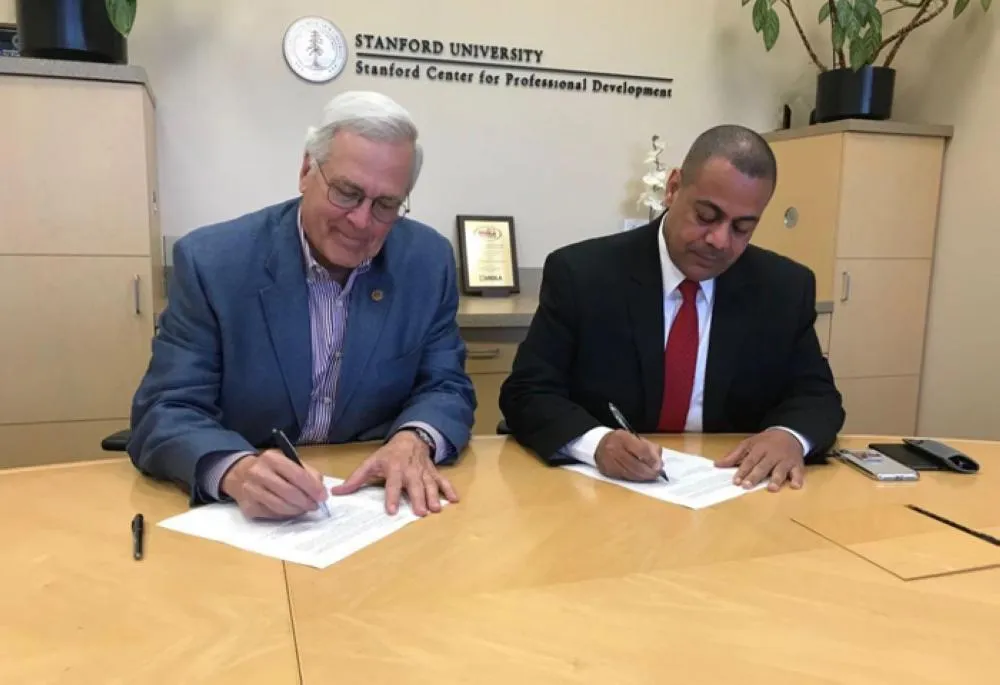Table of Contents
Saudi Arabia’s new technological academy, Prince Mohammed bin Salman bin Abdulaziz College of Cyber Security, signed a memorandum of understanding last year with Stanford, as part of a larger project to engage with educational institutions across the United States. The memorandum will aid the design of educational material for the Saudi institution. Crown Prince Mohammed bin Salman and his government desire to adopt our curriculum in order to technologically advance, enhance cybersecurity, and modernize their economy. Stanford, however, contradicts its values as a beacon of western intellectualism by supporting the totalitarian nation.
Stanford sees a business deal. But Saudi Arabia’s implementation of Islamic law punishes the LGBTQ community, treats women as second class citizens, disciplines theft with corporal punishment, and stifles freedom of expression. Apostasy laws upheld by the Supreme Court of Saudi Arabia sentenced the Saudi blogger Raif Badawi to 10 years of prison and 1,000 lashes for running an online platform that fostered dialogue on politics and religion. The “Winds of Freedom” do not blow in Riyadh.
The Islamist monarchy has no interest in what Western culture offers besides what advances its reign. The country wants to advance economically and technologically, but makes little effort to advance socially or intellectually. According to The World Press Review: “the total number of books translated into Arabic during the 1,000 years since the age of Caliph Al-Ma’moun [a ninth-century Arab ruler who was a patron of cultural interaction between Arab, Persian, and Greek scholars] to this day is less than those translated in Spain in one year.” As a leading entity of Western intellectual culture, Stanford should make it clear to Saudi Arabia that our culture is not only tech—it is philosophy, science, history, and letters—and we have principles that transcend the financial and technological interests the Saudis wish to exploit.
Globalists argue that if Saudi Arabia catches up with the United States in technological ability, the Kingdom will socially and intellectually westernize. However, technological and economic growth do not necessarily catalyze political liberalization. Consider China. Thanks in part to Western technological innovation and trade, China has made great economic strides in the past half century. And although millions of people have been lifted out of poverty, the Communist dictatorship continues to limit human rights and is more entrenched than at any point since Maoist times. The fact that Saudi Arabia’s sole interaction with Stanford is for the sake of technological advancement suggests a desire to remain intellectually closed-off, with only venal, utilitarian, and strategic exceptions. A purely technological contribution from Stanford would uphold the authority of the Saudi regime and might even contribute to illiberal ends.
Saudi Arabia has long been part of an unholy alliance with the United States, and the nature of this relationship should be condemned in its own right. The recent, brutal assassination of journalist Jamal Khashoggi and the ensuing reticence of President Trump to speak soberly about the issue epitomize our government’s moral confusion. As one of the institutions that represents the intellectual elite of our country, the University should be ahead of the inept government.
Saudi Arabia does not operate with the same intellectual values as Stanford. Rather than designing a cybersecurity curriculum for a theocratic country, perhaps we could find a way to uplift the minorities, intellectuals and moderate Muslims who are oppressed under an extreme implementation of Islamic law. These are the individuals whose beliefs and interests are most in line with our values of liberal education and freedom of expression. If helping these dissidents is unrealistic, Stanford should at the very least avoid contributing to the sinister Saudi system.









